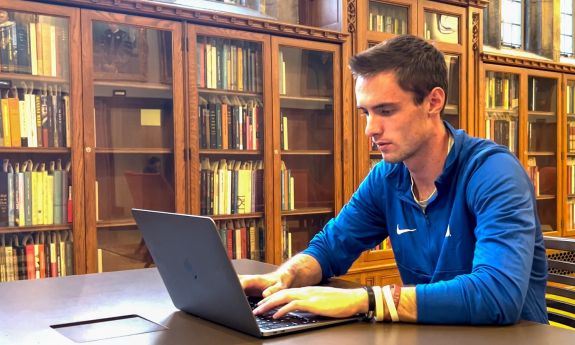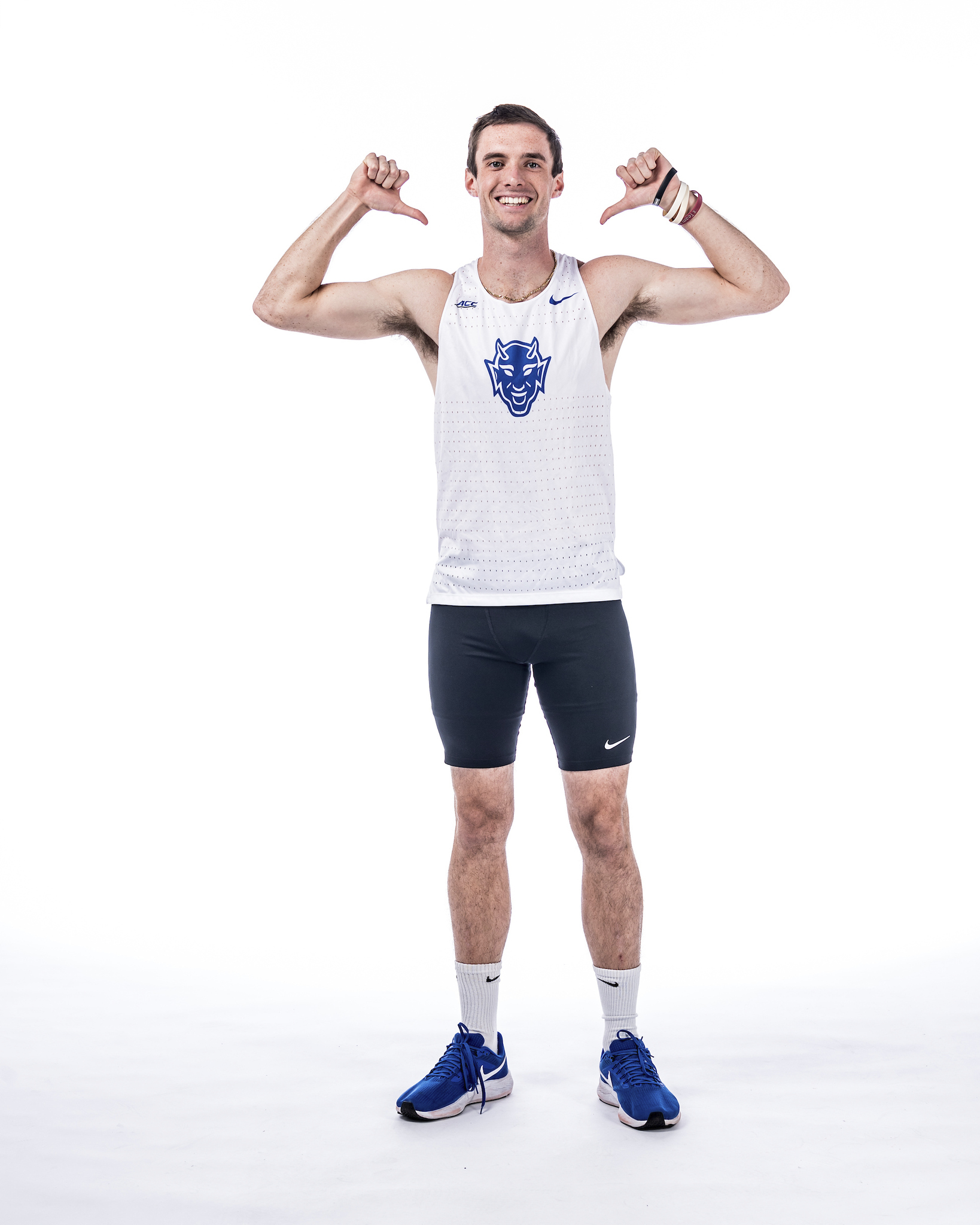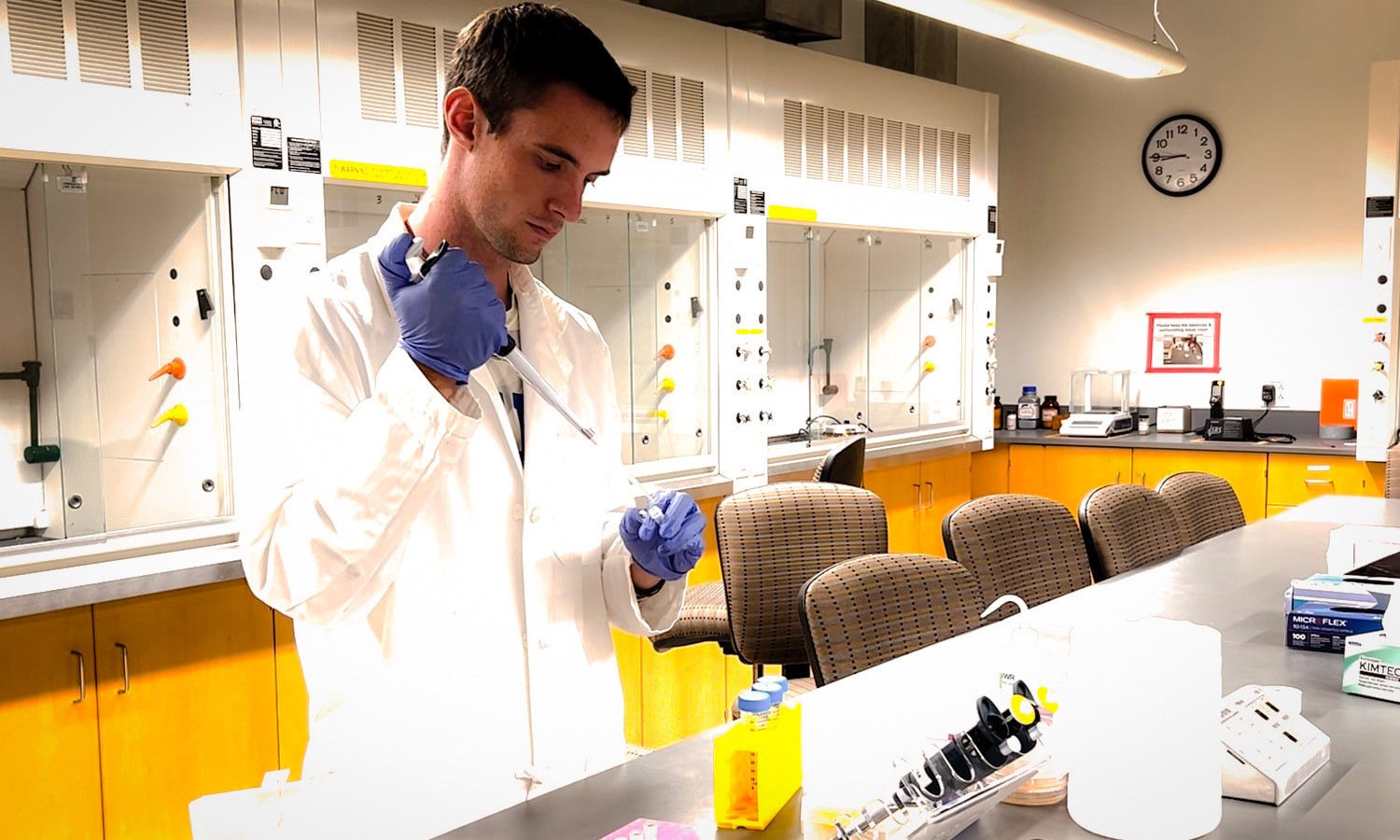Duke Senior Launches Himself Toward Big Rewards
Meet Danny Collins, Inventor, Athlete and Rhodes Scholarship Candidate

Next week, Collins will be among the finalists in the Collegiate Inventors Competition, hosted by the National Inventors Hall of Fame. The winners take away cash prizes and an accelerated patent application to the US Patent and Trademark Office.
Collins, a dual-major in marine science and biology, will be pitching his method to rapidly detect the presence of harmful and toxic algae in ocean water, using CRISPR, the gene-targeting technology. He’s been tinkering with it over the summers for three years now in labs at Harvard’s Wyss Institute under the guidance of Peter Nguyen and at the Duke Marine Lab with Jason Somarelli and Tom Schultz.
Runaway algae blooms are bad in two ways, Collins explains. Some species of the floating photosynthesizers produce toxins that can poison anything that encounters them. Others simply proliferate until they suck all the oxygen out of the water column, suffocating marine life.

The technology he’s pitching at the inventors competition is specifically hunting for Pseudo-nitzschia australis, an alga that produces a neurotoxin that accumulates in seafood tissues. The toxin attacks the human hippocampus – a memory center -- resulting in an unpleasant three-day bout of something called amnesic shellfish poisoning that can leave lasting damage to short-term memory and in some cases even be fatal.
Current methods to identify algae can take days and require skilled lab technicians, whereas Collins’ concept could offer “inexpensive, lab-free, rapid detection,” he explains, between classes and track practice. “Can we have a field device for fishermen to have on the deck of their boat?”
The competition in Alexandria consists of a 30-minute PowerPoint presentation before a judging panel that might interrupt repeatedly with questions. Having just been through a grueling dress-rehearsal for the scholarship interviews with Duke faculty and members of the Office of University Scholars and Fellows, Collins feels ready, but appropriately wary.
Somarelli, an assistant professor in medicine and marine science who has overseen Collins’ most recent work on the technology, says he really can’t claim any credit for his success. “He’s working on this pretty independently and he’s beyond most undergrads… and maybe even some faculty.”
Self-starting has always been his way.
Not having a jumping coach in high school, Collins took to YouTube for tips and training drills and pumped competing jumpers and coaches for more information at meets. He also recruited his dad, a former collegiate distance runner, as a training partner.
“He did not do high jump, but we kind of learned the event together through high school,” he says.
As a Division One athlete, lab worker, inventor, student and volunteer, time management is obviously key to Collins’ success. He says he persists mostly by compartmentalizing and focusing on one thing at a time. “I feel like there's been a good balance of academics, track, fun, sleep,” he says.
And, as a guy who doesn’t use bookmarks because he can just remember what page he was on, it was a struggle for his parents to finally persuade him to start using a time planner this year. But he did, and it’s working, he says.
“He’s just an excellent all-around human being,” said his Duke jumping coach Tatijana Jacobson, who was one of his nominators for the big scholarships. “He has an appreciation for what everyone else is doing and he’s supportive. He’s a great teammate.”
Somarelli first met Collins two years ago through the Rachel Carson Scholars and has been impressed by his enthusiasm for marine science and his can-do attitude. Marine science is a relatively new major – in fact, it didn’t exist when Collins matriculated -- but he has been sharing his enthusiasm with track teammates and anybody else who will listen, and building the community, Somarelli said.
Seeing a need for more community and enthusiasm around the new major, Collins and a friend launched a monthly seminar series to excite a wider audience about the field of marine science. They’re called “TIDE Talks,” like TED talks. Somarelli was the speaker last week, talking about what whales can teach us about cancer.
It’s kind of Danny’s obligation to succeed. His sister Katie, who was an all-American track athlete at MIT, is currently on a Marshall Scholarship at Cambridge studying machine learning. His dad, Jim, was a college runner and Rhodes Scholar, and is on the faculty at MIT. His mom, Mary, was a two-time all-American in cross country at Holy Cross, an NCAA post-grad scholar, and is on the faculty at Harvard Medical School.

Regardless of the outcome of the scholarship derby or the inventors conference, graduate school is almost certainly in his future. “I don't know if I want to be the synthetic biology guy that does marine science, or the marine science guy that also does synthetic biology.“
There’s a display case in the K-Center, where athletes study, that features five former Duke athletes who made Rhodes. Collins says it was pointed out on his recruiting visit. “I’d love to see my face up there, but the odds really are atrocious,” he says. “My big thing is just to understand that the odds are so low, I don't want to get too invested in these things.”